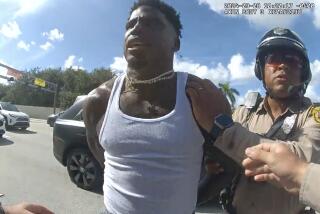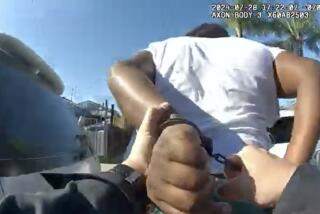Deutsche Bank executive alleges abuse by LAPD officers
- Share via
By sunrise, the bank executive was laid up in the hospital, his face swollen, the result of a late-night confrontation with two LAPD officers in Highland Park.
That much, everyone agrees on.
But nearly everything else that happened that May night to Brian C. Mulligan, a managing director and vice chairman at Deutsche Bank, remains in dispute.
The officers said they had to use force to subdue a snarling, thrashing man who arched his back, waved his arms, stiffened his fingers like claws and charged them on a residential street, according to a police report viewed by The Times.
One of Mulligan’s attorneys, J. Michael Flanagan, offered a more bizarre version of events: that the officers dragged Mulligan to a down-market motel and threatened to kill him if he left. When they discovered that Mulligan had escaped, his attorney said, the officers beat him so badly that he suffered 15 fractures to his nose and needed dozens of stitches.
Mulligan has filed a claim with the city, a precursor to a lawsuit, that lists at least $50 million in damages. Since the confrontation, Mulligan’s nasal passages “no longer operate correctly,” and he’s struggled to work and maintain relationships with his family, the claim said. No charges have been filed against Mulligan, though a spokesman for the city attorney’s office, which handles misdemeanor crimes, said the incident was under review.
Mulligan is a longtime Hollywood money man and deal maker who has served as co-chairman of Universal Pictures, chief financial officer of Seagram, Universal’s former owner, and chairman of News Corp.’s Fox Television.
Mulligan, 53, joined Deutsche Bank in 2009. He lives in upscale La Cañada Flintridge, less than 10 miles from the grittier Los Angeles neighborhood of Highland Park.
On the night of May 15, Flanagan said in an interview, Mulligan drove to a dispensary on the border of Highland Park and Eagle Rock to buy medical marijuana products, which help him sleep. He said law enforcement officers — he was uncertain from what agency — detained him, walked him to a run-down apartment complex and told him to go to the fourth floor, his attorney said.
While making his way through the building, Mulligan panicked, his attorney said. He ran to the street, spotted some law enforcement officers and sprinted in the opposite direction. Mulligan thought he’d be safe if he reached Occidental College, less than a mile away, Flanagan said. “He was running for his life,” the attorney said.
About 10:20 p.m., LAPD Officers James Nichols and John Miller responded to a report of a white male trying to break into a car outside a Jack in the Box, the police report said. Soon a second call came in reporting a similar break-in attempt — and a similar-looking suspect — not far away.
The officers came across Mulligan near an entrance to Occidental. Dressed in a pink shirt and tan pants, he matched the description of the would-be burglar, according to the report. His attorney said Mulligan never tried to pry open car doors. He was drenched in sweat and walked with an “unsteady gait,” the police report said. Yet he passed several sobriety tests.
According to the report, Mulligan told police that he’d ingested marijuana and, in recent days, “white lightning,” a nickname for powerful drugs known as bath salts. He said he hadn’t slept in four days, was going through a divorce and felt depressed, the report said. Mulligan also said he was being chased, according to the report, which nonetheless described him as calm, lucid and cooperative. Mulligan denies saying any of this or being under the influence of any drug that night, his attorney said.
The officers drove Mulligan to his Toyota Prius, which they searched; Mulligan’s attorney said he had not given them permission. They found his Irish passport and enough cash that they called in a supervisor, said the report, which did not specify an amount. Mulligan’s claim pegged the cash at about $5,000, a sum he said he normally carried for business travel. Then police took Mulligan — whose cellphone and passport remained in his car, his attorneys said — to the nearby Highland Park Motel, a low-rent building across from homes with barred windows.
From here, the two sides’ accounts diverge wildly.
The officers said Mulligan, complaining of exhaustion, had asked to be dropped there. Mulligan, according to his claim, said he was taken there against his will and told “he could not leave, under threat of death.”
At the front desk, Flanagan said, the officers took away Mulligan’s car keys and forced him to pay the roughly $40 room bill. They also gave him back the cash they’d found in his car, said another Mulligan attorney, Valerie Wass.
Then one officer escorted Mulligan to Room 208, which he said did not have a telephone. He eventually cajoled a clerk into returning his keys, his attorney said, and ran away from the motel. This week, a motel employee said he could not recall the incident.
About 1 a.m., the same uniformed officers responded to a traffic call not far from the motel. Miller said he spotted Mulligan trying to open the passenger-side door of an occupied silver van, the report said. The van sped off. The officers yelled at him to get off the sidewalk. They said Mulligan responded with expletives. (Flanagan disputed their account, saying it was unlikely the officers saw much from where they said they were parked, about 100 yards away.)
The officers soon gave chase, the report said. “At that point,” Mulligan’s claim said, “he was in such great fear that he believed the LAPD officers were not truly LAPD officers but may be impostors bent on robbing or killing.”
The officers caught up with Mulligan. “He took up a fighting stance — a karate-style stance,” said Los Angeles police Lt. Andrew Neiman, a department spokesman, in an interview, “and then charged at them.” Mulligan tried to tackle Nichols, the police report said, and Nichols took Mulligan to the ground. Neiman said the officers used reasonable force.
Mulligan’s attorney denied that his client charged police and accused the officers of using excessive force.
More to Read
Sign up for Essential California
The most important California stories and recommendations in your inbox every morning.
You may occasionally receive promotional content from the Los Angeles Times.










